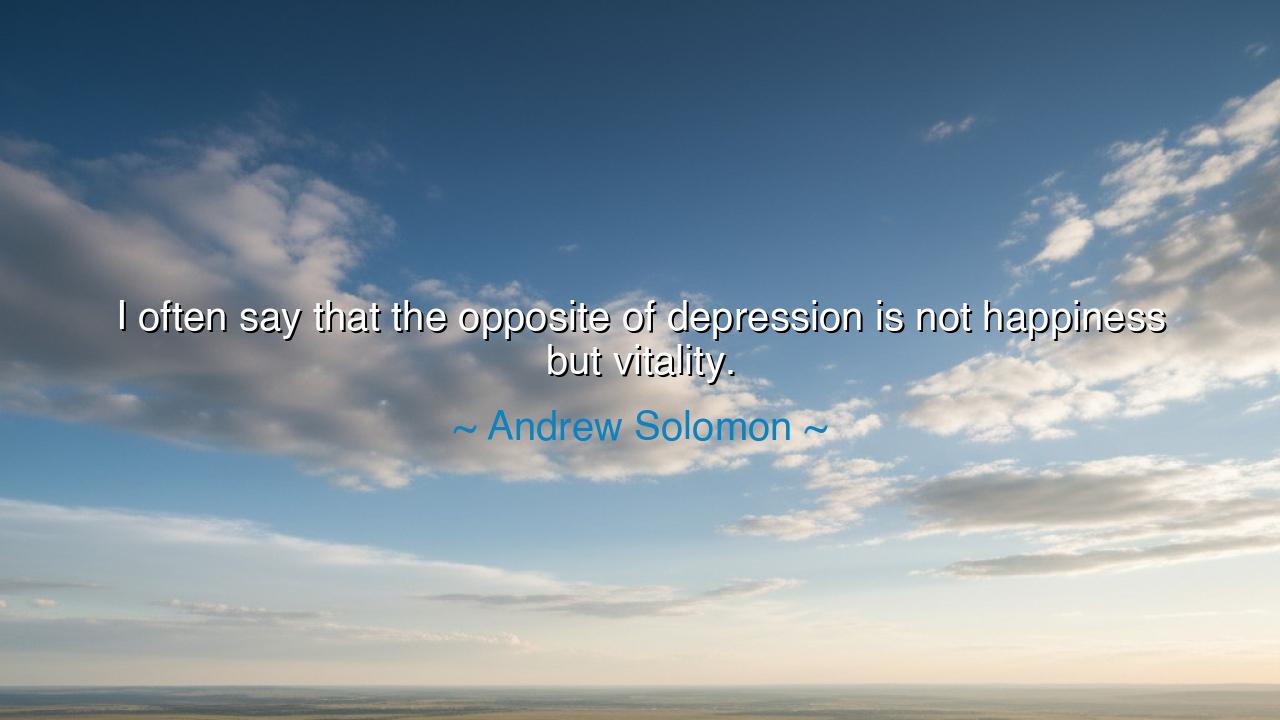
I often say that the opposite of depression is not happiness but






When Andrew Solomon declared, “I often say that the opposite of depression is not happiness but vitality,” he spoke as one who had walked through the shadowed valleys of the mind and returned carrying light for others. His words are not the cold reasoning of a philosopher, but the testimony of a traveler who has known the stillness of despair and the slow rebirth of life. In these few lines lies a profound revelation: that depression is not merely the absence of joy, but the absence of energy, of movement, of the will to live. The cure, therefore, is not to chase happiness, that fleeting bird of feeling, but to restore vitality—the deep pulse of being that gives strength to rise, to breathe, to act, and to hope again.
Solomon, a writer and scholar of the human spirit, learned this truth through suffering. In his memoir The Noonday Demon, he chronicled his battle with depression not as a poet of sadness, but as a witness of endurance. He came to see that those who suffer in darkness do not long for happiness—they long to feel alive. They wish for the return of motion to their souls, for the heart to beat again with purpose. For happiness is an emotion that comes and goes, like sunlight through clouds; but vitality is the sacred flame that endures, the power to keep walking even when the path is hidden.
To understand Solomon’s wisdom, we must look beyond emotion to essence. The ancients knew that the soul’s greatest tragedy is not sorrow, but stagnation. Aristotle taught that the good life lies in activity, in the exercise of one’s powers; Marcus Aurelius wrote that the soul perishes when it ceases to act according to its nature. Depression, then, is not simply sadness—it is paralysis of the spirit, the dimming of the divine fire that animates us. To recover vitality is to awaken that fire once more, to return to life’s rhythm even when the melody has not yet returned.
Consider the story of Vincent van Gogh, the painter whose art blazed with color even as his heart sank into darkness. Though he battled despair, his moments of strength were not marked by cheerfulness but by creative force. In the midst of his pain, he painted with feverish energy, pouring his spirit into canvases that still pulse with light. His vitality—the will to express beauty even when joy eluded him—was his salvation, however brief. His life reminds us that vitality is not the denial of suffering, but the defiance of it: the decision to create, to act, to love, even when one’s heart is weary.
Solomon’s insight challenges the modern obsession with happiness. The world urges us to be cheerful, to smile, to chase pleasure as though joy were proof of worth. Yet true healing lies not in constant delight, but in restored engagement—to rise from bed, to walk among others, to feel the weight of the world and bear it willingly. Vitality is the courage to live fully, to experience life’s pain and beauty alike, to take part in the great unfolding of existence. Where happiness seeks escape, vitality seeks immersion; where happiness fades, vitality sustains.
In this, Solomon’s wisdom speaks like the teaching of a Stoic or a mystic: do not seek comfort, seek strength; do not demand that life be light, but learn to kindle your own. The man who lives vitally does not flee despair—he transforms it into depth. He feels his sorrow and still chooses to move forward, to speak, to create, to give. This is the quiet heroism of life: not to be always happy, but to be always alive, always reaching, always breathing through the night toward dawn.
So, my child of endurance and wonder, take this teaching into your heart: do not measure your worth by your moments of joy, but by your ability to remain alive in spirit. When despair whispers that you are empty, remember that vitality begins with one small act—a breath, a step, a word, a reaching hand. Feed your soul with connection, with movement, with purpose, and happiness will come when it will. The goal is not constant brightness, but steady fire. For as Andrew Solomon teaches, the opposite of depression is not to laugh without reason, but to live with intention—to reclaim the sacred pulse of life itself. And when that pulse beats again, faint but persistent, know that you have already begun your return to the light.






AAdministratorAdministrator
Welcome, honored guests. Please leave a comment, we will respond soon